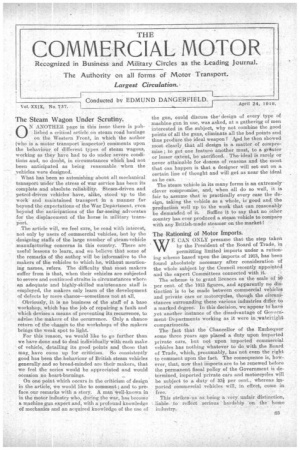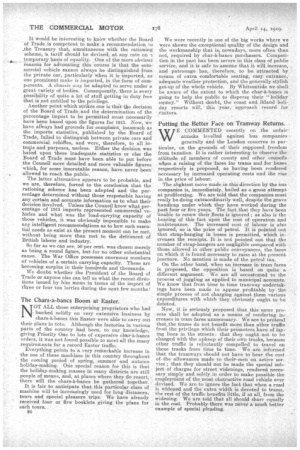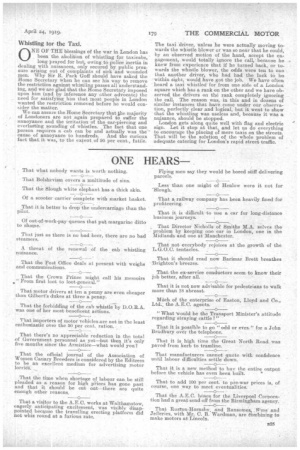The Steam Wagon Under Scrutiny.
Page 1

Page 2

Page 3

If you've noticed an error in this article please click here to report it so we can fix it.
0 N ANOTHER pagein this issue there is published a critical article on steam road haulage on the Western Front, in which the author (Who is a motor-transport-inspector) comments upon the behaviour of different types of steam wagons, working as they have had to do under severe conditions and, no doubt, in circumstances which had not been anticipated as being reasonable when the vehicles were designed. . What has been so astonishing about all mechanical transport under the stress of war service has been its complete and absolute. reliability. Steam-driven and petrol-driven vehicles °have, alike, stood up to the work and maintained transport in a manner far beyond the expectations of the War Department, even beyond the anticipations of the far-seeing advocates for the displacement of the horse in military trans port. . . The article will, we feel sure, be read with interest, not only by users of commercial vehicles, but by the designing staffs of the large number of steam-vehicle °manufacturing concerns in this country. There are useful lessons to learn, and we believe that some of the remarks of the author will be informative to the makers of the vehicles to which he, without mentioning names, refers. The difficulty that most makers suffer from is that, when their vehicles are subjected to severe and continued strains in circumstances where an adequate and highly-skilled maintenance staff is employed, the makers only learn of the development of defects by mere chance—sometimes not at all, Obviously, it is no business of the staff of a base workshop, which has the jolt of repairing a fault and which devises a means of preventing its.recurrenee, to advise the makers of the occurrence. Only a chance return of the chassis to the workshops or the makers brings the weak spot to light. . For this reason, we would like to go further than we have done and to deal individually with eaeh make • of vehicle, detailing its good points and those that may have come up for criticism. So consistently good has been the behaviour of British steam vehicles generally and so broad-minded are their makers, that we feel the series would be appreciated and would occasion no heartsburnings. On one point which occurs in the criticism of design in the article, we would like to comment; and to preface. our remarks with a story. . A manivell-known in in the Motes industry who, during the War, has become a machinegun expert and, with aprofound knowledge of mechanics and an acquired knowledge of the use of the gun, could discuss the.' design of every type of machine gun in use, was asked, at a gathering of men interested in the subject, why not combine the good points of all the guns, eliminate all the bad points and thus produce the ideal weapon? Aind he then showed most clearly that all design is a matter of compromise; to get_ one feature another, must, to a grater or lesser extent, be sacrificed. The' ideal is rarely or never attainable for dozens of reasons and the most that can' happen is that a designer will set out on a certain line of thought and will get as near the ideal as he can. The steam vehicle in its many forms is an extremely clever compromise, and, when'all do so well, it is fair to assume that in practically every case the design, taking the vehicle as a whole, is good and the production well up to the work that can reasonably be demanded_ of it. Suffice it to say that no Other country has ever produced a steam vehicle to compare with any British-made steamer on the market!
The Rationing of Motor Imports.
WE (JAN ONLY presume that the step taken by the President of the Board of Trade, in permitting limited imports under a rationing scheme based upon the imports of 1913, has been found absolutely necessary after consideration of the whole subject by the Council recently appointed and the expert Committees connected with it. The scheme is to grant licences on the scale of per cent. of the 1913 figures, and apparently no distinction' is to be made between commercial vehicles and private cars or motorcycles, though the circumstances surrounding these various industries differ to a marked degree. In this decision, we appear toi haVe yet another instance of the disadvantage of Government .Departments working as it were iii watertight compartments. The fact that the Chancellor of the Exchequer some three years ago placed a duty upon imported private cars, but not upon imported conunercial vehicles has nothing whatever to do with the Board of Trade, which, presumably, has not even the right to comment upon the fact. The consequence is, however, that, now that imports are to be renewed before the permanent fiscal policy of the Government ii determined, imported private cars and motorcycles will be subject to a duty of 33-k per cent., whereas imported commercial vehicles will, in effect, come in . , free, . This strikes:.us as being a very. unfair distinetion, • , liable _torefleet serious hardship "(mi.' the heine industry. It would be interesting to knew whether the Board of Trade is competent to make a recommendation to .the Treasury that, simultaneous with the rationing scheme, la tariff should be devised, at any rate on temporary basis of equality. One of the more obvious reasons for advocating this course is that the commercial vehicle tannot always be distinguished from the private car, particularly when it is imported, as one prominent make is imported, in the form of coinpunents. A chassis may be adapted to serve under a great variety of bodies. Consequently, there is every possibility of quite a lot of stuff getting in duty free that is not entitled to the privilege.
Another point which strikes one is that tate decision of the Board of Trade and the determination of the percentage import to be permitted must necessarily have been based upon the figures for 1913. Now, we have al'aays had grounds for complaint, inasmuch as the imports statistics, published by the Board of Trade, failed to distinguish between private cars and commercial vehieles, and were, therefore, to all intentts and purposes, useless. Either the decision was based upon these inadequate statistics or else the Board of Trade must have been able to put before the Council more detailed and more valuable figures which, for some inscrutable reason, have never been allowed to reach the public.
The latter alternative appears to be probable, and we are, therefore, forced to the conclusion that the rationing scheme has been adopted and the percentage determined without those responsible having any certain and accurate information as to what their decision involved. Unless the Council knew what percentage of 1913 imports represented commercial vehicles and what was the load-carrying capacity of those vehicles, it was obviously impossible to make any intelligent recommendations as to how such essential needs as exist at the present moment can be met, without being more than met to the detriment of British labour and industry.
So far as we can see, 50 per cent. was chosen merely as being a round figure, but for no other substantial cause. The War Office possesses enormous numbers of vehicles of a, certain carrying capacity. These are becoming surplus in their hundreds and thousands.
We doubt whether the President of the Board of Trade or anyone else can tell us what the recent directions issued by him mean in terms of the import of thee or four ton lorries during the next few months !
The Chars-a-bancs Boom at Easter.
NOT ALL those enterprising proprietors who had banked solidly on very extensive business by chars-a-basics this Easter were able to carry out their plans in toto. Although the factories in various parts of the country had been, to our knowledge, giving Priority One to lots of expensive char-a-banes orders, it was not found possible to meet all the many requirements for a record Easter traffic.
Everything points to a very retharkable increase in the use of these machines in this country throughout the coming period of spring, summer and autumn holiday-making. One special reason for this is that the holiday-making masses in many districts are still people of means, and, at places where they do resort, there will the chars-a-banes be gathered together.
It is fair to anticipate that this particular class of machine will be increasingly used for long distances, tours and special pleasure trips. We have already received four or five booklets giving the plans for such tours.
44 We ,vere recently in one of the big works where we were shown the exceptional quality of the design and the workmanship that is, nowadays, more often than not, required by char-a-bancs purchasers. Competition in the past has been severe in this class of public service, and it is safe to assume that it will increase, and patronage has therefore, to be attracted by means of extra comfortable seating, easy entrance, adequate weather protection, and the generally stylish get-up of the whole vehicle. By Whitsuntide we shall be aware of the extent to which the char-a-banes is going to help the public to disperse their "holiday money." Without doubt, the coast and inland holiday resorts will, this year approach record for aisitors.
Putting the Better Face on Tramway Returns.
E COMMENTED recently on the unfair attacks levelled against bus companies generally and the London concerns in particular, on the grounds of their supposed freedom from taxation. It is rather interesting to observe the attitude of members of county and other councils when a raising of the fares for trams and for buses respectively is proposed, as having been rendered necessary by increased operating costs and the rise in the price of labour.
The slightest move made in this direction by the bus companies is, immediately, hailed as a gross attempt at profiteering. We are told that the companies must really be doing extraordinarily well, despite the grave handicap under which they have worked during the past four or five years. The fact that they have been Unable to renew their fleets is ignored ; as also is the bearing of this fact upon the cost of operation and maintenance. The increased cost of labour is also ignored, so is the price of petrol. It is pointed out that strap-hanging in buses is permitted, which increases the receipts. It is not pointed out that the number of strap-hangers are negligible compared with those allowed in other public conveyances, the fares on which it is found necessary to raise at the present juncture. No mention is made of the petrol tax.
On the other hand, when an increase in tram fares is proposed, the opposition is based on quite a different argument. We are all accustomed to the process of juggling as applied to municipal accounts. We know that from time to time tramway undertakings have been made to appear profitable by the simple process of not charging against „them various expenditures with which they obviously ought to be debited.
Now, it is seriously proposed that this same process shall be adopted as a means of rendering increases in tram fares unnecessary. We are to pretend that,the trams do not benefit more than other traffic from the privilege which their promoters have of laying lines in the streets : that they ought not to be charged with the upkeep of their own tracks, because other traffic is reluctantly compelled to travel on those tracks from time to time. We are informed that the tramways should not have to bear the cost of the allowances made to their men on active service; that they should not be made the special subject of charges for street widenings, rendered necessary simply and solely .in order to make possible the employment of the most obstructive road vehicle ever devised. We are to ignore the fact that when a road is widened and the extra width is devoted to trams, the rest of the traffic benefits little, if at all, from the widening. We are told that all should share equally in the cost. Probably there waa never a much better example of special pleading.
Whistling for the Taxi.
ONE OF THE blessings of the war in London has been the abolition of whistling fpr taxicabs, long prayed for but, owing to police inertia in dealing. with nuisances, only secured by public pressure arising out of complaints of sick and wounded men. Why Sir R. Park Goff should have asked the Home Secretary When he can see his way to remove the restriction against whistling passes all understanding, and we are glad that the Home Secretary imposed upon him (and by inference any other advocate) the need for satisfying him that most people in London wanted the restriction removed before he would consider the matter.
We can assure the Home Secretary that Vie majority of Londoners are not again prepared to suffer the annoyance and the irritation of the ear-piercing and everlasting .sounding of whistles. The fact that one person requires a cab can be and actually was the cause of annoyance to hundreds. And the curious fact that it was, to the extent of 95 per cent., futile. The taxi driver, unless he were actually moving towards the whistle blower or was so near that he could, by an observed motion of the hand, accept the engagement, would totally ignore the call, because he knew from experience that if he turned back, or towards the whistle blower, the odds were ten to one that another driver, who had had the luck to be within sight, would have got the job. We have often heard a taxi whistled for from one side of a London square which has a rank on the other and we have observed the drivers on the rank completely ignoring the call. The reason was, in this and in dozens of similar instances that have come under our observation, perfectly clear and logical, but it went to show that the whistling was useless and, because it was a nuisance, should be stopped. London gets along quite well with flag and electric sign. Let it stop at that, and let us do everything to encourage the placing of more taxis on the streets. That will be the solution of the whole problem of adequate catering for London's rapid street traffic.






















